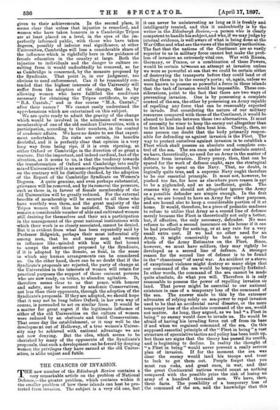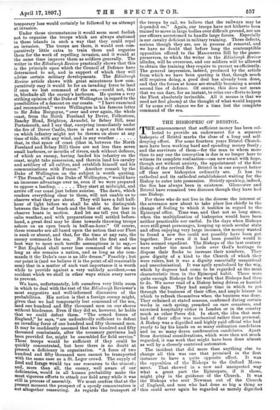THE CHANCES OF INVASION. T HE new number of the Edinburgh
Review contains a very remarkable article on the problem of National Defence,—the greater problem, which contains within it the smaller problem of how these islands can best be pro- tected from invasion. The subject is a very old one, but it can never be uninteresting as long as it is freshly and intelligently treated, and this it undoubtedly is by the writer in the Edinburgh Review,—a person who is clearly competent to handle his subject, and who, if we may judge by internal evidence, is well aware of what is being done at the War Office and what are the views of the military authorities. The fact that the nations of the Continent are so vastly superior to us in military force cannot but make the prob- lem of invasion an extremely vital one. War with Russia, Germany, or France, or a combination of these Powers, would be certain to'vmean an attempt at invasion unless we were so powerful at sea that we could be certain either of destroying the transports before they could land or of sealing them up in the enemy's ports ; or, again, unless we were known to possess so powerful a force in these islands that the task of invasion would be impossible. These con- siderations, point to the fact that there are two ways of preventing invasion. One is by possessing a complete control of the sea, the other by possessing an Army capable of repelling any force that can be reasonably expected to invade. But considering the nature of our military resources compared with those of the Continent, it would be absurd to hesitate between these two alternatives. It must of necessity be wiser to keep the enemy out altogether than to first let him land and then beat him. Clearly, then, no sane person can doubt that the body primarily respon- sible for defending us against invasion is the Fleet. The way to protect ourselves against invasion is to establish a Fleet which shall possess an absolute and complete con- trol of the sea. The sea once under our absolute control, we have, theoretically, no need for an Army in the matter of defence from invasion. Every penny, then, that can be spared for the work of defence ought, says the strategical purists, to be spent on the Navy. That, no doubt, is logically quite true, and a supreme Navy ought therefore to be our essential principle. It must not, however, be pushed too far, for here as elsewhere pure reason is apt to be a pigheaded, and so an inefficient, guide. The reasons why we should not altogether ignore the Army as a possible defender are simple enough. In the first place, we are bound to have an Army for other purposes, and are bound also to keep a considerable portion of it at home. It would, therefore, be a piece of pedantic madness to refuse to utilise that Army as a second line of defence merely because the Fleet is theoretically not only a better, but, if effective, the only necessary, defender. No man refuses to effect a second insurance on his house if it can be had practically for nothing, or at any rate for a very small extra cost. If we had no other need for an Army, it might conceivably be best to spend the whole of the Army Estimates on the Fleet. Since, however, we must have soldiers, they may rightly be developed as a second line of defence. A stronger reason for the second line of defence is to be found in the " chanciness " of naval war. An accident or a storm of exceptional violence might destroy so many ships that our command of the sea would be temporarily forfeited. In other words, the command of the sea cannot be made quite absolute, do what you will. Therefore it is only reasonable to possess the power of repelling invasion on land. That power might be essential to our national existence in case of a temporary loss of the command of the sea. The answer made to this by the extremer advocates of relying solely on sea-power to repel invasion used to be that an accidental naval disaster, or the mere temporary loss of the absolute command of the sea, would not matter. As long, they argued, as we had " a Fleet in being " no enemy would dare to invade us. He would be afraid of having his invading force cut off from its base if and when we regained command of the sea. On this supposed essential principle of the " Fleet in being " a vast structure of speculative tactics and policy has been built up, but these are signs that the theory has passed its zenith, and is beginning to decline. In reality the thought of " a Fleet in being" would never prevent a really serious plan of invasion. If for the moment the sea was clear the enemy would land his troops and trust to luck to get them out. People forget that you must run risks, and great ones, in war, and that the great Continental nations would count as nothing compared with the possible prize the risk of losing an army of a hundred thousand men. We have, then, these facts. The possibility of a temporary loss of the command of the sea, and the knowledge that this temporary loss would certainly be followed by an attempt at invasion.
Under these circumstances it would seem moat foolish not to organise the troops which are always stationed in these islands in such a way that they could repel an invasion. The troops are there, it would cost com- paratively little extra to train them and organise them for the work of repelling invasion, and it would at the same time improve them as soldiers generally. The writer in the Edinburgh Review practically shows that this is the principle upon which the Council of Defence have determined to act, and in support of which they will advise certain military developments. The Edinburgh Review article shows with great minuteness how com- paratively easy it would be for an invading force to land if once we lost command of the sea,—could not, that is, blockade all the enemy's harbours. He quotes a very striking opinion of the Duke of Wellington in regard to the possibilities of a descent on our coasts. " I have examined and reconnoitred," wrote Wellington in his famous letter to Sir John Burgoyne, " over and over again, the whole coast, from the North Foreland by Dover, Folkestone, Beachy Head, Brighton, Arundel, to Selsey Bill, near Portsmouth, and I say that, excepting immediately under the fire of Dover Castle, there is not a spot on the coast on which infantry might not be thrown on shore at any time of tide, with any wind, and in any weather . . . . . . that, in that space of coast (that is, between the North Foreland and Selsey Bill) there are not less than seven small harbours, or mouths of rivers, each without defence, of which an enemy, having landed his infantry on the coast, might take possession, and therein land his cavalry and artillery of all calibre, and establish himself and his communications with France." Another remark by the Duke of Wellington on the subject is worth quoting. " The French," said the Duke of Wellington," would have an immense advantage over us, even if we were prepared to oppose a landing They start at midnight, and arrive off our coast just before sunrise. The dawn, which renders everything clear to them, will not enable us to observe what they are about. They will have a full half- hour of light before we shall be able to distinguish between the line of beach and the line of sea, far less to observe boats in motion. And let me tell you that in calm weather, and with preparations well settled before- hand, a great deal may be done towards throwing troops ashore on an open beach in half-an-hour." Of course, these remarks are all based upon the notion that our Fleet is sunk or absent, and that, for the time at any rate, the enemy commands the sea. No doubt the first and the best way to meet such terrific assumptions is to say,- " But England shall never lose command of the sea as long as she remains a nation, and as long as she com- mands it the Duke's case is an idle dream." Possibly ; but our point is (and we believe it is the point of all reasonable men) that in a matter of such vast importance it is worth while to provide against a very unlikely accident,—an accident which we shall in other ways strain every nerve to prevent.
We have, unfortunately, left ourselves very little room in which to deal with the rest of the Edinburgh Reviewer's most suggestive and well-informed discussion of the probabilities. His notion is that a foreign enemy might, given that we had temporarily lost command of the sea, land one hundred and fifty thousand men on our shores without hindrance. Even if they did so, however, he holds that we could defeat them. " The armed forces of England," he says, " are undoubtedly sufficient to defeat an invading force of one hundred and fifty thousand men. It may be confidently assumed that two hundred and fifty thousand combatants, after the necessary garrisons had been provided for, might be assembled for field service." These troops would be sufficient if they could be quickly concentrated, but here there is no doubt at present a deficiency in organisation. "A force of two hundred and fifty thousand men cannot be transported with the same ease as a St. Leger crowd. The supply of food and forage would tax our resources to the utmost; and, more than all, the enemy, well aware of our deficiencies, would in all human probability make the most vigorous efforts to attack our field army while it was still in process of assembly. We must confess that at the present moment the prospect of a speedy concentration is not altogether reassuring. As regards the transport of the troops by rail, we believe that the railways may be depended on." Again, our troops have not hitherto been trained to move in large bodies over difficult ground, nor are our officers accustomed to handle large forces. Especially is our cavalry deficient in military training. These defects, serious though they are, are in process of removal, and we have no doubt that before long the contemptible opposition offered to the Manceuvres Bill by the game- preservers, to which the writer in the Edinburgh Review alludes, will be overcome, and our soldiers will be allowed to obtain the training they require to protect us efficiently. The general impression, indeed, produced by the article from which we have been quoting is that, though much still requires doing, a. good deal has already been done, and that the forces at home are steadily becoming a sound second line of defence. Of course, this does not mean that we can dare, for an instant, to relax our Efforts to keep the Fleet absolutely invincible. All it means is that we need not feel gloomy at the thought of what would happen if by some evil chance we for a time lost the complete command of the sea.



































 Previous page
Previous page